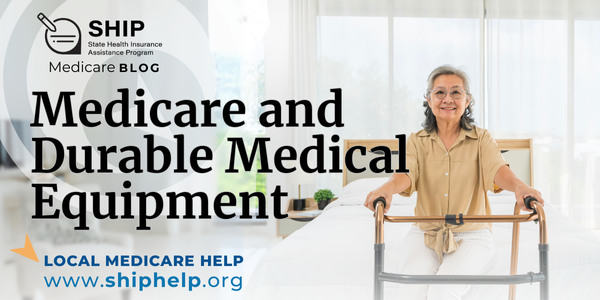Let’s discuss Medicare’s coverage rules for durable medical equipment, or DME for short. DME helps you do daily tasks like bathing and dressing.
First, what DME does Medicare cover?
Medicare usually covers DME if it:
- Is durable, meaning it can be used many times.
- Has medical purpose.
- Is appropriate and needed for use in the home, although you can also use it outside the home.
- Is likely to last for three years or more.
Examples of DME include wheelchairs, walkers, hospital beds, power scooters, portable oxygen equipment, catheters (if your need for them is permanent), prosthetics and orthotics, and some diabetes supplies, including glucose monitors. Whether you have Original Medicare or a Medicare Advantage Plan, the types of Medicare-covered equipment should be the same.
Medicare also covers some prescription medications and supplies that you use with your DME, even if they’re disposable or can only be used once. For example, Medicare covers medication used with nebulizers. It also covers lancets and test strips used with diabetes self-testing equipment.
There are some kinds of equipment and supplies that Medicare never covers. This includes equipment mainly to help you outside of the home. Medicare also doesn’t cover items that get thrown away after use or aren’t used with equipment. And Medicare doesn’t cover most equipment intended only to make things more convenient or comfortable, modifications to your home, or equipment that isn’t for use in the home. Examples of equipment that aren’t DME include surgical facemasks, wheelchair ramps, incontinence pads, and wheelchairs or scooters that are only for outside the home.
Next, how can you get DME covered by Medicare?
Your primary care provider, or PCP, must prescribe your DME. Your PCP must sign an order, prescription, or certificate. In this document, your PCP must state that:
- You need the DME to help a medical condition or injury.
- The equipment is for home use.
- And, if applicable, you had a face-to-face visit with your PCP. Your PCP should know if Medicare requires this visit for your DME.
Note that if you need a manual or power wheelchair or scooter, the process is different. Your PCP may need to send a prior authorization request to Medicare.
And finally, go to the right DME supplier.
Once you have your PCP’s order or prescription, you must take it to the right supplier.
If you have a Medicare Advantage plan, you must follow the plan’s rules for getting DME. Your plan may need you to get approval from the plan before getting your DME, use a supplier in the plan’s network of suppliers, or use a preferred brand of DME. Contact your plan to learn more about its rules.
If you have Original Medicare, you should get your DME from a Medicare-approved supplier that takes assignment (that is, agrees to accept Medicare’s payment terms). These suppliers have the lowest cost for you.
- Many suppliers are Medicare-approved but don’t take assignment. These suppliers may charge you more for your DME.
- Don’t use suppliers who haven’t signed up to bill Medicare for DME. Medicare won’t pay for equipment or supplies you get from these suppliers. This means you must pay the whole cost.
Call 1-800-MEDICARE or visit Medicare.gov to find a supplier.
Look out for DME fraud, errors, and abuse.
Watch for these red flags:
- You see charges for DME on your Medicare statements you didn’t need or never asked for.
- You were offered
free
equipment or supplies. - You had a DME provider ask for your Medicare number at a presentation, during a sales pitch, or on a phone call.
- You were given a cheaper, lower quality item but Medicare was billed for a custom or fitted item.
Be aware of aggressive marketing that tries to offer you free
equipment or talk you into changing DME providers. Before making a decision, speak with your doctor and your current provider to see if there is a need for you to change. Don’t give any personal information to someone who calls you offering DME that you do not want or need. Check your Medicare statements often. If you see any suspicious charges or believe your provider could have billed your Medicare by accident, call your provider to follow up about the potential error. If you think it could have been DME fraud or abuse, contact your Senior Medicare Patrol, or SMP.
Still have questions?
Your SHIP is here for you! You can contact your SHIP for any Medicare-related questions or concerns you have. SHIP counselors are government funded to provide trusted, unbiased Medicare counseling at no cost to you. (Depending on your state, your SHIP may go by another name.) SHIP Locator or call 877-839-2675 (and say Medicare
when prompted) to find your local SHIP.
If you think you have experienced potential Medicare fraud, errors, or abuse, contact your local Senior Medicare Patrol using the online SMP Locator or by calling 877-808-2468.

